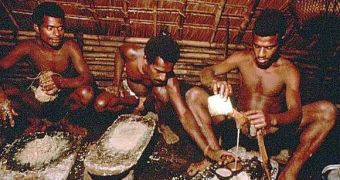Vanuatu, previously known as the New Hebrides, a small archipelago nation on the Pacific, was famous even at the beginning of the 20th century for hosting one of the fiercest cannibalistic tribes of the area. Now, they are battling to defend the reputation of their national drink, a bitter peppery concoction called kava, which is famous for its medicinal, stress-relieving but also hallucinogenic properties.
Since 2000, the beverage has been banned by many European countries and Canada, as it was found that it can induce severe liver toxicity to some people. Now Australia has joined this group, as it appears the hallucinogenic beverage is being abused in some Aboriginal communities.
Kava plays an important role in the Pacific Ocean cultures of Polynesia, Melanesia (Vanuatu is part of the Melanesia) and some parts of Micronesia. In Vanuatu, kava remains an essential evening ritual. The roots of the Piper methysticum plant are washed, chopped, mashed (the best with a dry coral stick) and strained into coconut cups.
The onset of kava is 20-30 minutes, with effects usually lasting for two hours, but sometimes even up to eight hours after ingestion.
"Everyone knows here that kava is not dangerous. It is not like alcohol or nicotine. It is not addictive," said Dr Vincent Lebot, a kava expert and enthusiast, and Vanuatu resident.
Locals believe that kava, once widely available worldwide in pill form as a natural drug against stress and anxiety, was encroaching on the territory of international pharmaceutical companies.
In the middle of the controversy, a new report from the World Health Organization seems to reveal a connection between kava and liver damage.
The Medicines Control Agency in the U.K. stated "There is no evidence to support a safe dose of kava," as there is currently no way to "predict which individuals are at risk of adverse reactions."
"It relaxes you. In fact, I'm struggling to talk right now! Beer makes you excited. It sets people at each others' throats. But kava makes you want to sit still. If you think about big markets, if they open up to kava, then it's going to be [as popular as] the Cuban cigar." explained Chief Selwyn Garu, one of Vanuatu's most senior tribal chiefs, enjoying his second cup at dusk.
"I'm not sure. In Europe, consumers are already scared. The damage is already done." warned Lebot.

 14 DAY TRIAL //
14 DAY TRIAL //